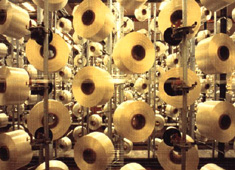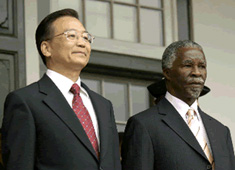SA, China sign key textiles deal
22 June 2006
SA President Thabo Mbeki and Premier Wen Jiabao of China have signed a key agreement to help protect the South African textile industry from the influx of cheaper Chinese imports.
Under the deal, signed at Tuynhuys in Cape Town on Wednesday, China has agreed to cut textile imports to South Africa by a third, with quotas on Chinese textiles and clothing imports to be imposed for three years. Wen's trip is the highest-level Chinese visit to South Africa in 50 years.
"We are willing to take measures to restrict the export of textiles to South Africa to ensure the stability in the textile market in this country," Wen told journalists in parliament after his meeting with Mbeki.
"President Thabo Mbeki and I reached a full understanding between ourselves," he said. "We both agree that the issues in the textile trade will in no way compromise the overall economic relations between the two countries."
Wen and Mbeki signed a total of 13
different agreements, ranging from cooperation in agriculture, minerals and energy, trade and nuclear non-proliferation.
Strategic partner in Africa
Wen's two-day visit is part of a seven-nation African trip aimed at consolidating political and economic relations between China and African countries - South Africa in particular. China considers South Africa to be a strategic partner in its attempts to strengthen ties with Africa.
Both countries are signatories to the New Africa-Asia Strategic Partnership, which aims to improve economic relations between the continents of Africa and Asia and build on the strong political, cultural and individual ties that have existed for decades.
Stronger economic relations through increased foreign direct investment, market access and trade relations are intended to help alleviate poverty and underdevelopment on both continents.
A booming economy
China is now the
world's seventh-largest economy, and among those growing the fastest. Its GDP rose 9.5% in 2004, the largest increase in eight years, and has grown by an annual 8% over the past decade. This is partly a rapid rise from a low base, but also a result of ongoing economic reforms, which include joining the World Trade Organisation in 2001.
Trade between SA and China has grown significantly since the two countries forged diplomatic ties in 1998. Chinese imports to SA and South African exports to China grew 30% between 2004 and 2005. China was South Africa's second-largest import trading partner in 2005, comprising 9% of total imports, and eighth-largest export partner, comprising 3% of total exports from South Africa.
China enjoys a massive trade surplus with SA: in 2005, imports from China totalled R31.5-billion, while exports came to R8.8-billion.
Chinese investments into South Africa currently total US$130-million (about R980-million), mostly in a chromium mine.
South African investments in China, by companies such as Anglo American, SAB Miller, the MIH Group and property group LRPS, amount to $400-million (about R2.7-billion).
Accelerated growth
The Foreign Affairs Department said Mbeki and Wen also discussed how China could help with the Accelerated and Shared Growth Initiative, which aims to boost South Africa's economic growth to 6%, as well as the Jipsa initiative to improve on and attract skills to SA.
They also looked at preparations for the Forum on China-Africa Cooperation summit scheduled for later this year, and assessed the progress of the New Africa-Asia Strategic Partnership, a socioeconomic development plan adopted a year ago.
Also on the table were nuclear non-proliferation, cooperation on international forums such as the G77+ group of developing countries and the newly formed UN Human Rights Council, and the forthcoming G8 summit of leading developed nations, to be held in
Russia in July.
South Africa, China, Mexico and Brazil are to take part in the G8 summit as "Strategic Outreach Partners", discussing climate change, international energy security, health care and education.
Mbeki and Wen discussed the G20 group of emerging economies, focusing on the successful conclusion of the Doha Development Round of World Trade Organisation negotiations. China chaired this forum in 2005 and South Africa is the current chair. The two countries have similar views on reforming and strengthening the international trading and financial system.
Wen is to meet Deputy President Phumzile Mlambo-Ngcuka on Thursday, with whom he will co-host the China-South Africa Business Cooperation Forum, and meet with representatives from local Chinese enterprises and the South African immigrant Chinese community.
SouthAfrica.info reporter


| 








